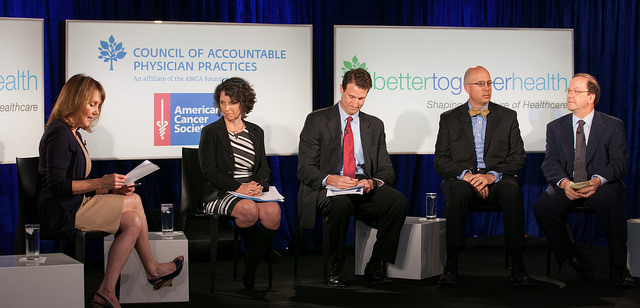
As American Heart Month comes to a close, it’s important to acknowledge that heart health should be a priority year-round. One of the key risk factors of heart attack and stroke is hypertension, and according to the CDC, 1 in 3 U.S. adults has high blood pressure. The good news? It’s controllable. Kaiser Permanente recently published a Q&A with Joseph Young, MD, internal medicine physician and clinical hypertension lead for The Permanente Medical Group – and we’ve included excerpts from that conversation below.
KP:
Can you give us a quick ‘Blood Pressure 101’?
Joseph Young, MD:
Blood pressure is just the pressure of blood flowing inside the body’s blood vessels. The top number is the pressure when the heart pumps at its peak. The bottom number is the pressure when the heart is relaxing and filling back up with blood. An ideal blood pressure is 119/79 or lower. A top number between 120 and 139 or a bottom number between 80 and 89 is called ‘prehypertension.’
KP:
What is high blood pressure?
Young:
If your blood pressure is 140/90 or higher, you have high blood pressure, also known as hypertension. As an aside, in a healthy, active person, what might seem like low blood pressure is often normal. In the United States, 29 percent of the adult population, or roughly 70 million people, has high blood pressure. Being overweight, lack of physical activity, too much salt or alcohol, stress, older age, genetics and family history, and various diseases all can contribute to high blood pressure. The good news is that it is easy to treat high blood pressure with a healthy lifestyle and a number of well-tolerated, once-daily medications.
KP:
What are the main guidelines for healthy practices that can reduce risk?
Young:
Regular physical activity is very important and helps to lower blood pressure. Pick something you enjoy — that will make it easier to stick with it. And it doesn’t have to be fancy. You could just walk briskly at least 150 minutes a week, for example. Limit salt intake, too, because salt causes fluid retention, which increases blood pressure. Many people don’t realize that most salt doesn’t come out of a salt shaker; it’s from processed and restaurant food. So, cook with unprocessed fresh fruits, vegetables and lean sources of protein at home, and limit how often you eat out to no more than one to two times a week. Don’t drink too much alcohol. If you smoke, quitting is the most important thing above anything else that you could do for your overall health. Smoking does not increase blood pressure, but smoking combined with high blood pressure or with any other risk factor is especially dangerous.
For more information, check out the full article available at Kaiser Permanente’s News Center.


